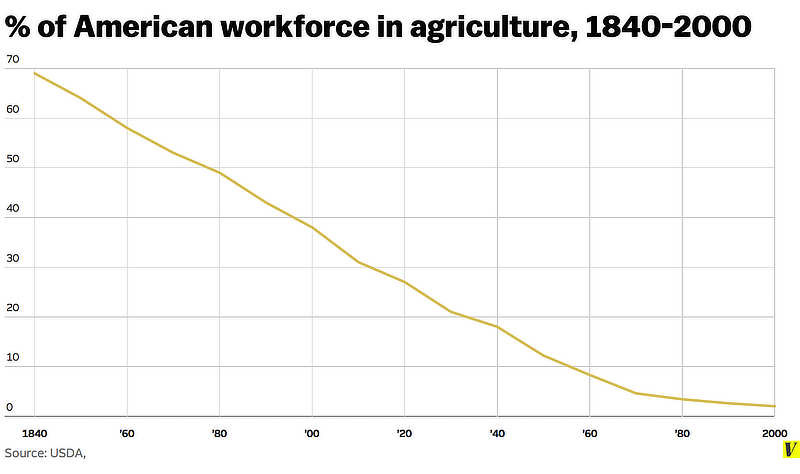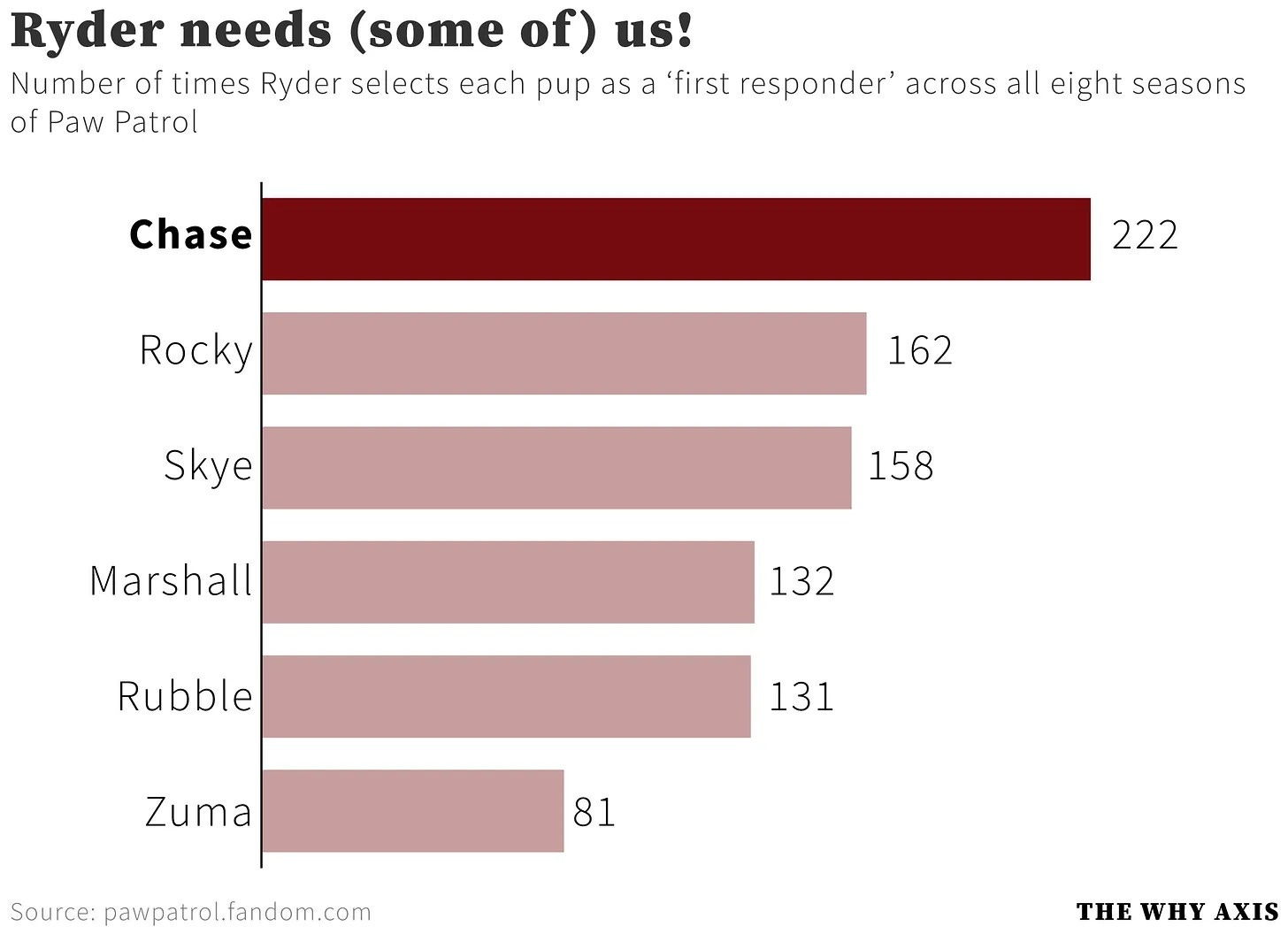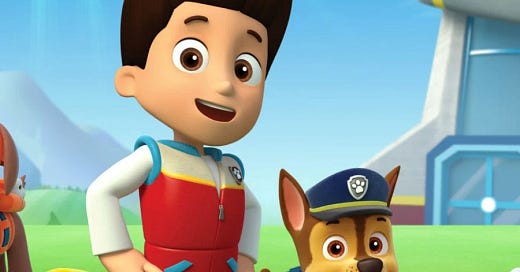Today we introduce the first-ever guest column to Paper Robots. Matt Pierson, Associate Director of the Nebraska Council on Economic Education and involuntary Paw Patrol enthusiast, steps in to give Stephen a break.
Parents face a paradox: we want to teach our kids to be good members of the community, but also to be independent. As adults we face the same tension. We want the support and guidance of an intimate community, but we also value our freedom. We want to spend time with friends and family, but also be able to hop in the car and make a quick escape when we feel like it. Navigating the tension between community and independence is a lifelong skill. We can give our kids a head start by teaching them about the economic concept of specialization, or in kindergarten terms, “community helpers.”1
At some point in a World History course, students learn a gloomy lesson about what their lives would have been like if they lived before the Industrial Revolution gave us the economic specialization that we know today. Sunup to sundown, you spend your day trying to acquire enough calories to support you and your family. You had almost no time to do anything but find calories. You just…farmed calories. You did not have time to learn an instrument or draw fancy pictures. You certainly would not have time to sit and type out your silly musings about economics and a children’s show. But with the advent of the Industrial Revolution, humans were able to specialize in a wide variety of skills and jobs. I live in Nebraska, and I can drive for eight hours and see nothing but corn and soybeans. I can sit back and relax knowing the only part of the process I need to be part of is eating the cornbread when it’s on my plate.
Just take a look at this graph that uses USDA data.

In 1840 almost 70% of the American workforce was involved in agriculture. By the new millennium that percentage fell under 5%. When fewer people must work in agriculture it opened people to be able to do other work. In modern society we enjoy the luxury of specializing in a certain job and letting others specialize in other jobs. It is a beautiful balance where everyone contributes something different to society, but no one must contribute everything to society. And there’s a much happier, perkier way to teach kids about this balance than the saturnine lesson of pre-industrialization. Paw Patrol to the rescue!
Paw Patrol is a kids’ TV show that began in 2013. It’s the story of a community, Adventure Bay, and their set of canine community helpers. They are led by Ryder, their child leader, and six pups with a wide variety of skills. There is Chase, who is the police pup and the overall dog leader of the group. You have Marshall who is the clumsy firefighting pup, Skye, who is the air rescue pup and has a helicopter she flies around in, Rocky who has a garbage truck and often fixes things in creative ways. Rubble is the construction dog and my personal favorite, and finally Zuma the nautical pup who performs sea rescues in his boat. Together they keep the people of Adventure Bay safe from a never-ending variety of peril.
All the problems in Adventure Bay are solved by not just one pup but a specially selected team. The problems in every episode are brought up by Ryder, and the pups are selected to help based on their abilities. Each pup has a specialized ability to help with crises. They solve their issues as a team. They each bring a specialized skill to the table. Each pup has a special set of talents, but no one pup has all the talent. Just like in real life, the pups are better off doing what they are good at, while leaving things they are not good at to others. Do what you do best and trade for the rest.
Now, are problems facing Adventure Bay going to evenly distribute themselves among the pups? No way. There are certain problems that will come up more often that will be solved by a specific pup. Take a look at this graph looking at which Paw Patrol members are deployed the most.

Chase seems to be the favorite of the bunch, being deployed over 222 times while Zuma is only deployed 81 times.2 Is this an issue? Chase is the police dog, Zuma does water rescues. How many times have you had a situation where the police had to respond? Most people have probably had a few. How many times have you had to call for a water rescue? Probably a lot less. Zuma’s skills are important, but Chase’s are more in demand, since someone needs to deal with the apparently alarming crime rate in Adventure Bay. Supply and demand are always at play, even when we are watching cartoon pups protect a fictional city from peril.
The Paw Patrol is not one person having to solve all the issues for the citizens, but a collection of people with varied skills who contribute to society. We rely on a complicated and complex tapestry of people and skills from all over the world to function. I wake up every morning and have breakfast and drink some coffee, barely even taking a second to think of the probably hundreds of people and skills it took to get it there. We are in this together whether we realize it or not. While it may feel sometimes that we are an island, we are far from it. People around the globe are directly or indirectly involved in our lives every single day.
Like many economic concepts, understanding the concept of specialization is a life skill. It shows us how to relate to people — appreciate what each person brings to the table. Take a little bit of stress off your children’s shoulders and talk with them about how you want them to be independent and competent, but there is also a vast network of humans out there all working together to achieve their goals. They need you, and you need them. Make them feel a little less alone and more part of a team.
You can learn more about Matt’s work with Nebraska teachers and students here and here.
Did you know that the state of Virginia has economics learning standards for Kindergarten through 3rd grade? The 2015 Kindergarten standard reads “The student will match simple descriptions of work that people do with the names of those jobs.” Just like in Paw Patrol! Go for it, teachers, use Paw Patrol in your class.
The audio version of this reads “60” and “16” times respectively, but our hardworking team has found updated data.





@Matt, question: can't specialization also make us feel more alone? I'm the only Center for Econ Ed director in Richmond, so I super look forward to conferences where I get to see other people who do my job. The ones who really GET what I'm doing. It's not like, say, realtors, who have dozens with the same job right there in the city.
Zuma probably makes more than Chase due to her specialization.